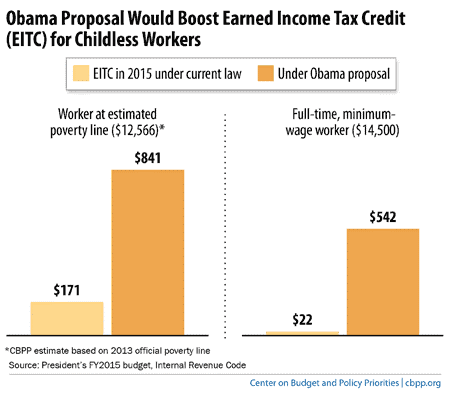March 4, 2014 at 5:00 am - Center on Budget and Policy Priorities
http://www.offthechartsblog.org/obama-budget-would-extend-eitcs-pro-work-success-to-childless-workers/
Posted by:
Chuck Marr
Update, March 4: Wefve just updated our in-depth
analysis of recent proposals to strengthen the EITC for childless
workers.
Building on calls from both sides of the aisle to expand
help to low-income childless workers — the sole group of workers that the
federal tax code taxes into (and, in many cases, deeper into) poverty —
President Obamafs 2015 budget would strengthen
the Earned Income Tax Credit (EITC) for this left-out group.
Next to Social Security, the EITC combined with the refundable portion of the
Child Tax Credit constitutes the nationfs most powerful anti-poverty
program. These two credits lifted 10.1 million people out of poverty in
2012. The EITCfs most glaring hole, however, is its almost complete
exclusion of childless workers (that is, childless adults and non-custodial
parents).
The Presidentfs proposal would expand the tiny childless workersf EITC
considerably, raising the maximum credit to about $1,000 from its current $500
(which few childless workers are eligible for) and raising the income limit to
qualify for the credit from less than $15,000 to about $18,000 in 2015.
As the graph shows, for example, the credit for a childless adult with wages
at the poverty line (projected at $12,566 in 2015) would rise from $171 to
$841. For a childless adult working full time at the minimum wage (and
earning $14,500), the credit would jump from $22 to $542 in 2015.

The proposal would also allow childless adults aged 21 to 25 to qualify for
the EITC. Childless adults under 25 are now ineligible, a serious
shortcoming given the importance of young people gaining a toehold in the
economy. (It would raise the upper age limit from 65 to 67 as well.)
Expanding the childless workersf EITC would help a diverse group of low-wage
workers, from store clerks to child care workers to truck drivers to home and
office cleaners. Just under half are women, and while many are young
workers just starting out, we estimate that roughly 35 percent are at least 45
years old.
The benefits of a stronger EITC would go beyond raising their incomes and
helping offset their federal taxes. Leading experts from across the
political spectrum believe that an expanded credit would help
address some of the challenges that less-educated young people (including
young African-American men) face, such as low and falling labor-force
participation rates, low marriage rates, and high incarceration rates.
The President proposes to offset the $60 billion cost of the proposal over
2015 to 2024 by eliminating tax breaks that allow some high-income people to pay
much lower or no taxes on certain kinds of income, including the gcarried
interesth tax break and the gS corporationh loophole.
The EITC has enjoyed broad bipartisan support over the years because it helps
low-income people struggling to make ends meet while encouraging
work and personal responsibility. The Presidentfs proposal would make
it even better.